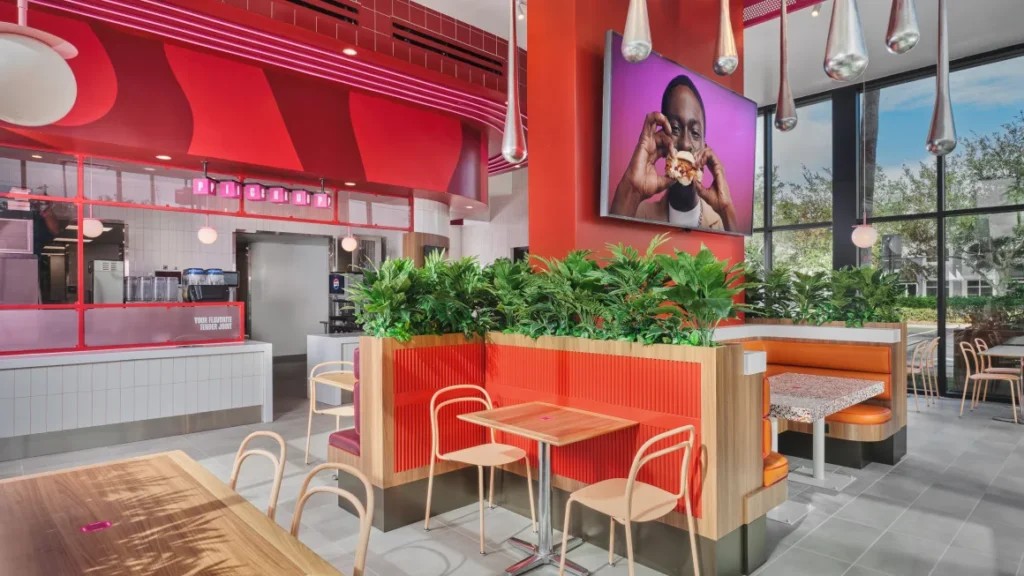KFC’s “finger lickin’ good” slogan usually refers to chicken, but it’s taking on different meaning at its newest location.
Sauce and dips are the star at “Saucy,” a prototype opening Friday in Orlando. The restaurant, which ditches the chain’s familiar red for pink, is centered around 11 new dips and chicken tenders — both favorites of Gen-Z eaters who crave adventurous flavors and boneless chicken.
The launch of Saucy comes amid challenging times for the Yum Brands-owned chain, which has posted several consecutive quarters of declines for its US restaurants. KFC’s attempts at value meals and limited time offerings haven’t resonated with consumers, causing it to struggle against trendier chicken chains, like Wingstop and Raising Cane’s.
With Saucy, the idea was to modernize the “finger lickin’ good” slogan and focus on one of its most “iconic products,” which are its tenders, according to Christophe Poirier, KFC’s chief concept officer.
“Building on this modernized ‘finger lickin’ good,’ we came up with a new vision, which is a lot of sauces, a lot of color and a lot of drinks,” Poirer told CNN, adding that it’s “specifically targeted to Gen Z.”
Tenders are appealing to younger eaters because they are easy to eat on-the-go and can be generously customized, Poirer said. A survey of restaurants menus from Technomic Ignite, a food consulting firm, shows that the availability of chicken tenders has grown more than 5% over the past five years.
As a nod to KFC’s 11 spices and herbs in its fried chicken, Saucy is debuting with the same number of sauces served in flights of four. They range from spicy, including a jalapeño pesto ranch and a creole honey mustard, to sweet, such as teriyaki and Thai sweet and spicy.
Sauces have become a “key driver” of innovation across the fast industry, said R.J. Hottovy, head of analytical research at Placer.ai, adding that Saucy should “help KFC modernize its brand and align with current industry trends.”
“By expanding its sauce options, KFC can maintain a streamlined menu similar to its competitors while offering customers the ability to personalize their orders to match their taste preferences,” Hottovy told CNN.
Saucy is also serving a slimmed-down menu compared to its flagship brand, focusing on some sandwiches, but new desserts, fruity beverages and sides, such as toasted rolls, fries and coleslaw, are also on the menu.
The interior features kiosks for ordering, brightly color seats and tables and a space for live entertainment with the outside covered in pink with a bright Saucy logo that includes a small mention that it’s a KFC brand. Orders can also be taken at the drive-thru.
Saucy will initially only have one location, but it might expand the concept in the future.
Rise of the spin-offs
Opening a standalone concept rather than incorporating the ideas into KFC helps the brand “acquire a ton of learnings” and gives them “permission to play,” rather than be beholden to people’s impression of KFC, Poirer said.
That’s happening at Taco Bell, another chain owned by Yum. Last week, it opened a new cafe near San Diego that leans heavily into specialty beverages and snacks targeted at younger customers and likely emulates the success of McDonald’s-owned CosMc’s.
Referencing those two concepts, David Henkes, senior principal and head of strategic partnerships for Technomic, told CNN that chains “do this more as a chance to experiment and create an ‘incubator’ for innovation that allows them to try things that otherwise don’t currently fit within the menu of the chain.”
Of course, not all spin-offs work: IHOP, which opened a fast casual concept called Flip’d, retired the brand after just two years.
Email your news TIPS to Editor@kahawatungu.com or WhatsApp +254707482874

